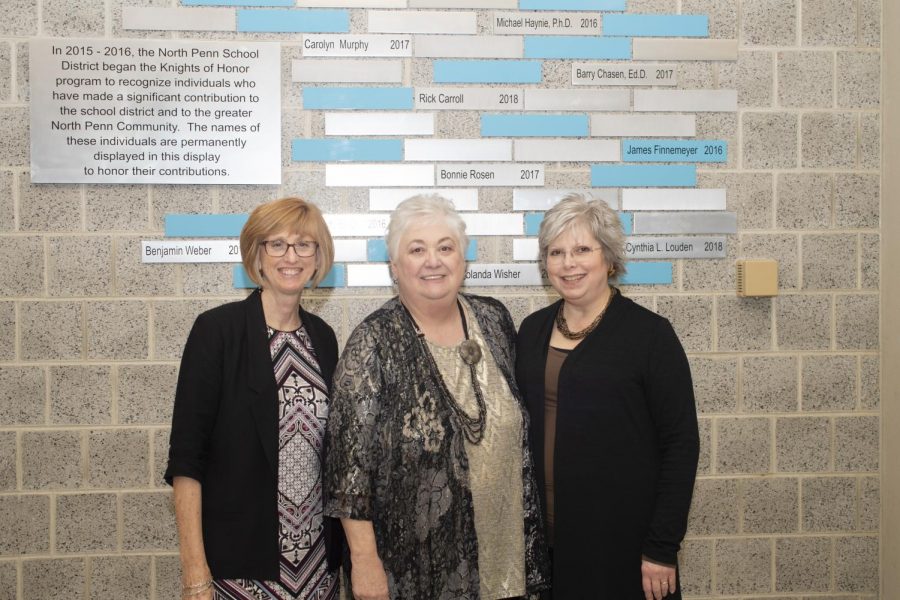Debra Buckner, Cindy Louden, and Andrea Roney after Louden’s October 2018 Knight of Honor Induction.
50 Years of NPHS Theatre; Act Two-The Roney/Buckner Years
In this continuation of The Knight Crier's series looking back on the 50th anniversary of North Penn High School Theatre, Executive Editor Connor Niszczak sits down with current NPHS Theatre Co-Directors Andrea Roney and Debra Buckner.
TOWAMENCIN-It takes a lot to fill the shoes of a theatre titan, taking the helm of an internationally recognized theatre program and keep it operating at its same level of quality. In 2005, that’s exactly what Andrea Lee Roney did. First joining NPHS Theatre as a parent volunteer, Roney would later take over for 34-year NPHS Theatre Director and Founder Cindy Louden.
With 26-year choreographer Debra Buckner by her side, Roney has continued the tradition of North Penn High School Theatre excellence for the past 16 years.
Scene 1- The Transition
Roney’s youngest son, Drew, became involved with NPHS Theatre during his sophomore year, and when Zombie Prom was chosen to go to the International Thespian Festival during his senior year (festival occurred in the summer of 2004), Roney dove right in, using the skills she had learned from her time as General Manager of the Pennsylvania Shakespeare Festival to take on the challenge of raising funds to get Thespian Troupe #5464 to Nebraska.
“I went to Ms. Louden and I said, ‘Cindy, I know the show is all put together, but I know you have to get to Nebraska; is there anything you need help with?” She basically said ‘yeah, we need to figure out how much money we need to raise, and then raise it.’ I looked at [the numbers] and said ‘you’re going to need $70,000. Her mouth dropped. So she said ‘can you do that? Can you raise that?’ and I said we can certainly try,” Roney explained.
Roney launched a full-fledged fundraising campaign, reaching out to the community, elementary school Home and School associations, and even Outback Steakhouse.
“The big thing was that Cindy knew the man who was, at the time, the manager for Outback. She went to him and asked if Outback would be a sponsor. I think their contribution ended up being like $15,000. He said ‘we could actually come to the high school, set up grills in the parking lot next to the cafeteria, we could feed people, and charge’…they kept very little of the money. They kept basically the cost of the food, which for them was very minimal. We set up the stage and had kids entertaining; it was like dinner theatre. People came, and the majority of what they spent went towards our trip,” Roney said.
“What I didn’t realize at the time was we actually ended up raising more than we needed, because we were very frugal in how we put together the trip. We didn’t actually need the full $70,000, but it put a nest egg in the North Penn Theatre activity account. I inherited that when I came on as the teacher,” Roney continued.
After Zombie Prom, as Louden began to think about retiring, Roney became the natural frontrunner to be Louden’s successor. Since Roney did not have the proper certifications, Louden used her connections at Gwynedd Mercy University to enroll Roney in the necessary courses.
“She had strong connections at Gwynedd Mercy, and sent me over there where I could work on getting a Master’s in Education with certification in English. So I started investigating that program, I investigated a substitute teacher position at North Penn so I could fund my courses. The plan was that Cindy was going to retire at the end of the 2005-2006 year. Spring 2006 would be her last year,” Roney said.
Things did not go as planned. As Roney was working out how to balance her Gwynedd Mercy classes with her North Penn responsibilities, Louden gave her a call.
“I was putting all this in place in the fall of 2004, and she called me, a little before Thanksgiving. She said ‘guess what? The district is doing this great retirement package…I’m going out the end of this year!” She says ‘we’ve got to get moving and get you student teaching with me.’ It was kind of amazing,” Roney explained.
Louden made calls to Gwynedd Mercy, and eventually, Roney was able to skip over some of the typical student teaching steps and transition directly into student teaching at North Penn High School.
“So there I was, student teaching with Cindy. I was also part time teaching two courses at Gwynedd Mercy to help pay for all of this. I was taking courses at Gwynedd Mercy…I was crazy! Oh, and I had had a bunion operation in December, so I was walking around in a surgical boot,” Roney remembered.
As Roney began her student teaching in the spring of 2005, Louden decided that Roney should join Debra Buckner to co-direct Once Upon A Mattress.
“Deb and I looked at each other and said ‘we’ve never worked together…so here is what we’re gonna do.” I told the students, ‘I will direct scenes up to the musical number, and then, if we need to adjust the blocking for Mrs. Buckner, we will do that later to get you into the dance number.’ And Deb was saying in her rehearsal, ‘we’ll choreograph the dance number, and if we need to adjust some of the blocking for Mrs. Roney’s scenes, we’ll do that at the first run through,’” Roney said.
Roney and Buckner soon discovered just how in sync they already were.
“Devon [Taylor, who was playing the Queen] looks at me and says “Mrs. Roney. Mrs. Buckner keeps saying that we’re going to adjust the dances to your scenes, and you keep saying we’re going to adjust the scenes to the dances, and we’re always at exactly the right position for both of you. What’s going on??” That’s when Deb and I realized we kind of thought the same way about plays, and it was the beginning of a beautiful friendship and partnership. That’s when we realized we really saw theatre in the same way,” Roney remembered.
Roney continued student teaching with Louden up until the last week of Once Upon A Mattress rehearsals. On her very last day, as she was out with students on a prop run, Andrea Roney received a call that changed her life.
“The following Friday, my last day of student teaching, I was going out on a prop run with a couple kids, and I get this call on my cell phone. It’s the ESC and they’re like ‘We want to bring you in to talk about…I think we want to offer you a job in English…You need to call on Monday morning.” “Are you talking about Cindy Louden’s job in theatre, because that’s what I interviewed for.” “Oh yeah, that’s it. You got the job! We need to make an appointment to talk about it.” The kids are hearing this over the phone and [insert excitement beyond belief noises here]…the car is practically shaking! So I said “you can’t tell anybody! Until I actually go in and sign papers, we really can’t tell anyone about this,” Roney explained.
Needless to say, that cat left the bag almost immediately.
“Cindy can’t keep a secret! So I go back into rehearsal next week, and long about Thursday, kids are walking by me, saying [in a ‘we know something about you’ kind of way] ”Hi, Mrs. Roney! How are you doing?” So I pulled Devon aside and said “You told! I told you you couldn’t say anything!” “It wasn’t us, it was Ms. Louden!!” It was a riot; the cat was out of the bag pretty quickly. I had signed the papers at that point, I just thought there would be a more formal announcement. Not any place I ever expected to be was in a high school. I love doing theatre, I love teaching, I love directing, I love all parts of it! This job allows me to do it all. Here it is, 16 years later, and it’s been a great ride,” Roney said.
In Cindy Louden’s 2018 Knights of Honor Induction ceremony, Roney shared that she never had plans to teach high school, which “was not the right answer for Cindy.” Having faced bullying during her own high school years, Roney vowed to never step foot in a high school after graduating, and never did, until her children began at North Penn High School.
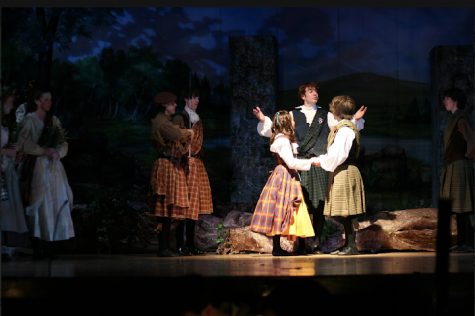
Like many of the students she has taught over the last 16 years, theatre was Roney’s escape.
“I was bullied very badly in school. Elementary through high school. I didn’t really fit in. I was just different. I loved theatre. I loved literature. I loved books from the time I was little; my vocabulary was off the charts from the time I was eleven. My way out, my thing that helped me survive, was doing community theatre at Dutch Country Playhouse (DCP). DCP was actually founded by my parents and my grandparents, so working there as a kid, the adults there were mentors,” Roney explained.
Once Roney returned to a high school environment after maturing and gaining experience in collegiate and educational theatre, she recognized just how different high schools are from an adult’s perspective. Ever since, she has made it a personal goal to prevent bullying in North Penn High School theatre and discuss when it does occur.
“I was helping out with Zombie Prom, and I realized it was very different being in high school as an adult than being there as a kid. I found it was very different. We talk a lot about bullying and harassment…there have been times when that has happened in the theatre program under my watch, and it’s been extraordinarily hurtful for the students. As their teacher, I felt I let them down horribly. Unfortunately, as adults, we just don’t always see it. We’re not in the places where it happens. And I know that from my own life. I know it happens, but we try very hard for it not to happen,” Roney explained.
“That’s something I try to bring into my teaching. An understanding of what it means not to be doing the things in high school that are acceptable to other people; the ‘traditional’ high school route. Though in a place as big as North Penn, there’s so many opportunities, and I certainly see the different opportunities as being valued a lot more than it was when I was in high school,” Roney added.
Scene 2- The Other Half
As mentioned in Scene 1, Cindy Louden paired Andrea Roney and Debra Buckner together as co-directors of Once Upon A Mattress in 2005; they would become the core partnership of NPHS Theatre, which continues to this day.
Buckner’s NPHS Theatre journey began long before Roney came into the picture. In fact, Buckner was a cast member of the original productions back in the early seventies; Anything Goes (1972), Oklahoma! (1972), and Hello, Dolly! (1973). As for what Buckner remembers most about the early days?
“The animals, definitely! Standing next to a live horse [in Oklahoma!] on stage and hoping it would do what it was supposed to do. It was fun to be with people who had as much enthusiasm for being in theatre as I did. Cindy had a true passion, and it was infectious. I learned a lot. She gave me opportunities to do some choreography, which was lovely. To work with your peers on a different level, but ultimately all working towards the same goal,” Buckner explained.
In 1973, Buckner found herself choreographing the waiters’ dance in Hello, Dolly! after an issue arose with the current choreographer; she was just 17 years old!
“Back in those days, if I was thrown into a position like that as an adult, I might be concerned that I didn’t have the abilities to be put in that position. When I was at that age, it was like “okay!” Cindy provided many opportunities, as has Andrea. They both push me to the next level when it comes to directing and taking positions that I might not otherwise have been forthright enough to step up and do on my own. All of which I’m grateful for; it’s been a wonderful 42 years,” Buckner said.
In a genuine ‘small world’ moment, Roney happened to be in the audience of Oklahoma in 1972. Her mother had read in the paper about the new NPHS Theatre program, so the two drove down from their home in the Upper Perkiomen School District to check out the show.
“I remember straining to hear some of the singing, I remember the live animals. What I didn’t know at the time was that my future partner in crime was dancing the dream ballet as Laurey. We were destined to come together,” Roney said.
When NPHS Theatre was still finding its footing in these days, the shows were relatively ‘bare-bones.’ Buckner remembers the technology available to them back then was pitiful compared to now…but some things truly never change.
“We laugh now when we tell the kids to project…back in those days, we had nothing. Nothing! No mics at all! Then you’re trying to sing over the orchestra, which in hindsight was not very smart…trying to sing over the blaring orchestra with no mics at all. Now when we tell the kids to project, they’ve got a much lovelier microphone (and we still can’t hear them!),” Buckner joked.
Buckner moved on from North Penn after graduating, but still had roots there, as her mother was the high school cafeteria manager. In 1978, a few years after Buckner had graduated, she and Louden reconnected.
“Cindy had put in [a weekly ‘help wanted’ NPHS newsletter] that she was looking for a choreographer for the spring musical, and my mom happened to mention it to me. So she talked to Cindy, and the long and short of it is we connected. So I drove from New Jersey that entire January until May to do the choreography for The Music Man [in 1979]. My mother-in-law became very ill, so by the following year, we moved back here to support her. My husband [John Buckner] came on the following year [as technical director] because, as Cindy says, ‘if you want to see your wife, you don’t really have a choice,” Buckner explained.
“John also tells the story that he walked into the auditorium during a rehearsal, looked at the rather shaky set being built by the students, and said ‘I better do something before somebody gets hurt,’” Roney joked.
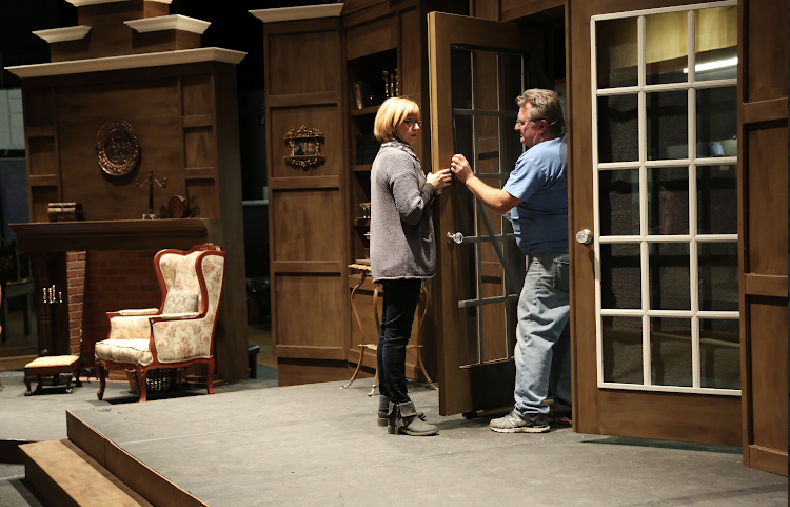
Buckner’s relationship with Louden as a student has stuck with her these past 42 years, impacting the everyday interactions she now has with her very own theatre students.
“Cindy is an inspirational person who inspires you to do your best work, always with integrity. It’s also with relationships. I’d like to think that’s exactly the way it is now, which is exactly why I told Andrea I was willing to stay on, as long as the program still stood for the same things that were important to Cindy,” Buckner said.
“I always say, it’s about the process of collaboration, and that’s what I love. It’s 40 years later, and I’m still doing it. That collaboration-not only with the other theatre staff, but with the students-the give and take, the back and forth, the same as the give to the audience, the audience back to you on stage…It’s just a wonderful, wonderful experience. The students have so much to give, and for me, I know I’m a better person for having worked with all these amazing people over 40 years. I may not remember their names, but I certainly remember each and every show,” Buckner continued.
Scene 3- The Community
For decades, NPHS Theatre has been attracting alumni to come back and support the program for years after they graduate, whether it be joining the staff, supporting their children through their own years in the program, or simply filling the auditorium as audience members.
“I still find that students who are out there say ‘what can we do?’ and I still hear some of our alum, who are out working in theater professionally…they almost always mention NPHS Theatre, they always try to get a plug in for the program. It’s just wonderful that they get it. They get how important arts education is for all students, whether they go into theatre or not,” Roney said.
The skills learned from participating in a NPHS Theatre production are, of course, valuable to those students who continue on into professional theatre, but, as Roney explained, theatre skills are applicable in every area of life.
“The communication skills, the sense of self-worth and empowerment, learning to collaborate with others, learning that there’s not one solution to a problem. We’re all in this together. Collectively we built this incredible thing that none of us could have done individually. Most students get it by the end. A lot of people go into teaching, psychology, become lawyers, pastors, rabbis, go into communications, publicity, the entertainment business in other ways. There’s a lot you can do with what you learn from doing a play,” Roney explained.
“Simply put, theatre promotes all the skills that are needed to be successful in everything that people are looking for. All those skills are skills that are worked on throughout the theater. It’s limitless in terms of where you can go with the skills that are practiced in all parts of theatre. We’ve had a lot of people work with us from the outside that are not theatre people. People bring their love of theatre and their expertise areas to help the students grow in all kinds of ways,” Buckner added.
Of all these skills that come from participating in theatre, the single most important may be the sense of community that comes from collaborating to put together a show; or, as Roney says, “It takes a village to raise a play.”
“There’s no other art form that’s so collaborative.The people that come in to help with all these different things, whether it’s the parents helping to feed everybody, or somebody passing out t-shirts, or hanging posters across the district, or simply coming and sitting in the seats and supporting the kids and all their hard work. It takes everybody! It is countless hours. If you figure there’s usually about 50-55 kids in our casts, then 30-35 in the orchestra, then 20-30 kids working technical crews and sewing costumes, then we have a staff of 12-13 adults who are monitoring and mentoring all these different areas. Then you count everybody there is there 3 hours on a weeknight and up to 10 hours on a Saturday…you multiply that out, that’s thousands and thousands of hours of creativity and energy that has gone into a production,” Roney noted.
“Then, the curtain rises and it looks effortless, and the audience has no clue. We don’t really want them to see the sweat of it; that’s not what they’re there to enjoy. That’s what Deb talks about with the process. It’s that process of getting to that moment where the literal or theoretical curtain goes up, and the lights go on, and the audience goes ‘ahh!’ There it is. You don’t necessarily do it for the audience applause, but it’s sure nice when it happens. That process of taking all those different energies and talents, and pulling them all together to make this piece of art,” Roney continued.
Roney shared one recent example, from 2018’s Fiddler on the Roof, of that sense of collaboration and social-emotional learning that comes from theatre.
“When we go to do Fiddler on the Roof, for instance, and Dani Coradetti [2011 alum and Assistant to the Producer] comes back to work with us. She’s embraced her mother’s half of her Jewish faith, and she knows a woman who makes challah; she knows the background of the sabbath and all of those traditions that happen in Fiddler. We invite her into a rehearsal, and she takes us through a whole ‘what is a sabbath about and what are the traditions.’ Then she comes back to the Friday night show, which is Sabbath, and she brings her fresh challah, and literally gives us her blessing in the back hallway at intermission, and we have a moment of Sabbath together. You can’t make that up. What more incredibly hands-on, educational, social-emotional learning can you get than something like that? It gives me chills to think about it. I don’t think a single company member who was back there will ever forget that moment or forget the importance of that culture, that show, and the story we were telling. That’s not something you get as an audience member. Hopefully, some of that community and collaboration rolls off into the show they are seeing,” Roney explained.
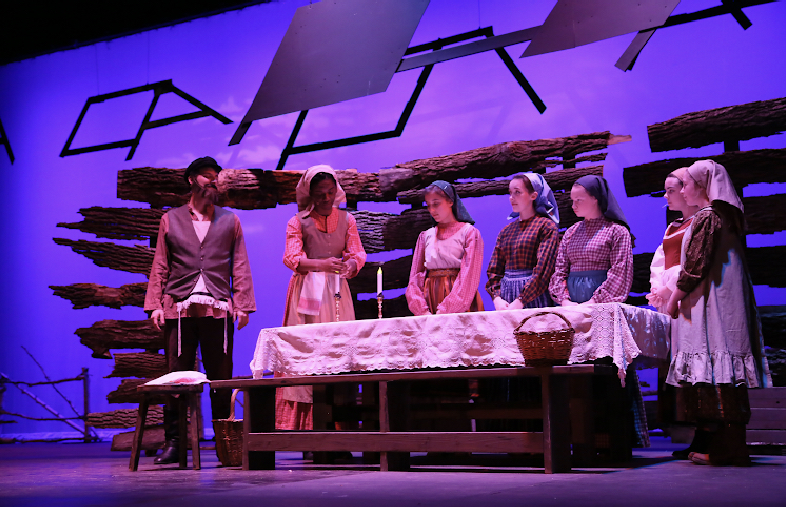
As Roney and Buckner work with the rest of the NPHS Theatre staff to arrange 50th Anniversary celebrations, they’re trying to discover why so many alumni consider the program ‘the best times of [their] high school years.”
“As we put together this 50th Anniversary Committee, it’s beginning with ‘what do you remember best?’ Why do you still look back on this as the best times of your high school years? What was it that still has you thinking about that?’ I think that’s a testament to what Cindy built. Very often, it’s not even us that passes along the tradition or the rules; it’s the seniors turning to a sophomore and saying ‘we don’t jump off the edge of the stage’, ‘you’re on time for rehearsal’, ‘you need to learn your lines’, or ‘this is the North Penn way of doing things.’ It’s the students that carry the torch from class to class to class, and they don’t even know how far back it goes. The ones sitting here now don’t realize how far back those traditions go,” Roney said.
“I think it’s about a vision. Cindy had a vision. Everyone who’s interested in coming to give back shares in that vision. I also think that’s why the transition from Cindy to Andrea was successful. They share that vision. That helped take the program into the future, because it could have very easily fallen apart. It’s been fun for me to be able to share a vision with two directors,” Buckner added.
Scene 4- The Thought Processes
As with Cindy Louden, I spoke with Roney and Buckner about some of the philosophical aspects of what goes into choosing a show, casting, and how they and their students make creative choices. An idea that both mentioned repeatedly is always doing what’s best for the sake of the show, not just for yourself.
A quintessential example of a student doing just that came in the spring of 2013, during AIDA. It was the final performance on Saturday night (Sunday matinees would be implemented the following year because of this incident), and Shweta Akolkar, who was portraying Aida, was utterly exhausted.
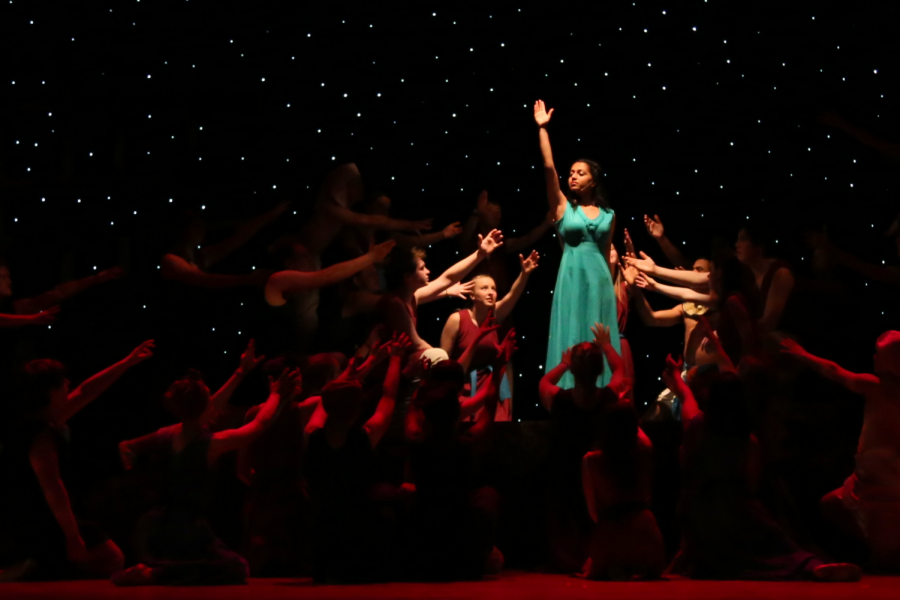
“We had been through grueling tech rehearsals for ten days, into dress rehearsals, into performances, and she got to that Saturday night show and was just exhausted. She had given her all through the entire performance process of playing Aida. During the dinner break, Mr. Klenk was giving her tea, and we were letting her take a nap to help her energy come back. Her voice wasn’t shot in terms of injury, she was just tired. She came off the stage at the end of the first act, which is just this incredible number of “The Gods Love Nubia”; she lead that whole thing and it was amazing! It’s still one of my favorite moments in a show. She got backstage and practically stumbled into Mr. Klenk and said “I don’t have a voice left. I’m done. It’s shot,” Roney remembered.
During intermission, Roney and Buckner told Akolkar that she could modify and ‘talk-sing’ her big number in Act Two, and they, along with pit conductor Matthew Klenk, fully expected her to…until the split second before the song began.
“She got to that number and, at the same time, Deb and I grabbed each other’s hands and said ‘she’s gonna go for it. She’s not going to talk-sing a single moment of this.’ We could see that Matt realized the same thing at the same moment, and he gave her a look saying ‘I’ve got you. I’m here for you.’ She blew it out of the auditorium! It was one of the bravest things I’ve ever seen on stage,” Roney said.
The loss of a lead’s voice happened again just two years ago, during 2019’s Mamma Mia! When senior Sammi Stec, portraying Sophie, lost her voice during the Gold Card Matinee, sophomore Ali Coles quickly stepped in to sing Stec’s final number, “I Have A Dream.”
“People think of teamwork with sports, but the students are there for each other and they know that they’re there for each other. It was a matter of ‘Ali, can you go?’ ‘No problem,’ Buckner explained.
“Every show has moments. If I were to go through the years, there’s a story like that for every single show that’s ever transpired. That’s what I mean by it’s not necessarily what the final product is on stage. It’s really more about the people and the students themselves. It’s a support system,” Buckner continued.
Roney and Buckner had a moment themselves during Children of Eden, in the spring of 2008, that was one of their first major creative differences, but it ended up being further confirmation of how in-sync they truly were. Buckner had been choreographing a scene where Eve is going around to different family members as she is dying and reminiscing on life. Roney came in once the scene was finished, and something clicked immediately; Eve is 900 years old, so her family should be coming to her, not her going to them, Roney thought.
“Deb looked at me and there was a moment of ‘you’ve got to be kidding me.’ Then I saw her stop, and I watched her eyes, thinking through the story and the song, and she went ‘you’re right. We’ll restage it after break.’ I came back in later and they had restaged it; she flipped it and retaught it right then. That’s why I say she’s an amazing choreographer and collaborator, because she could have easily said to me ‘I just spent three hours on this, this is my thing. It’s staying.’ But that’s what we always come back to; what’s for the good of the play,” Roney explained.
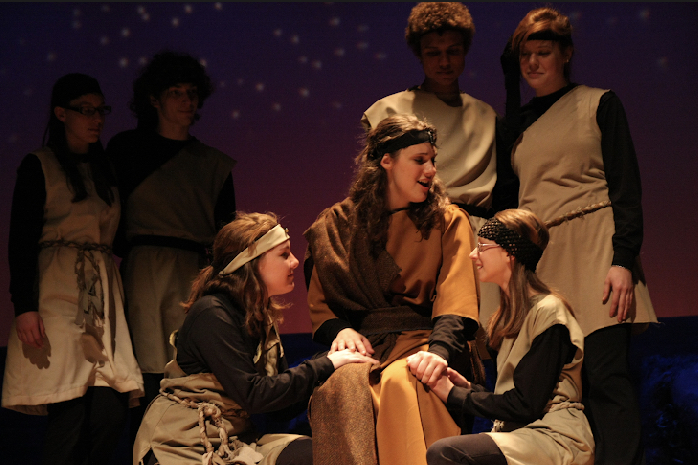
“That’s what it has to be. What best tells the story? What needs to happen to tell the story? I also think we can agree to disagree. We can leave a rehearsal saying ‘that’s not working, I agree, I don’t know what we’re going to do.’ Usually, we go home, think about it, come back, and say “well I was thinking maybe we could try this,” Buckner added.
Often times, Roney and Buckner will take time to think about a creative problem, and reconvene with the exact same solution.
“That’s what’s so eerie. We go away and process and come back in and she’ll say ‘what if we do this?’ and I’ll be thinking the exact same thing, or vice versa. That’s where you know the collaboration is working. We’re at the service of the play. The play’s not there to make us look good. We’re there to put on this production and help the kids tell the story. That’s what we’re there for. It’s not about us, it’s not about our egos, it’s not about anything else but that,” Roney said.
With such a variety of shows in NPHS Theatre’s repertoire, I asked Buckner and Roney to explain the thought process behind how they go about choosing which two productions will be put on each school year.
“We look at the company, we look at how students are growing, how voices are maturing, how movement is maturing. I go to the middle school shows, although there is always a huge change between 9th grade and 10th grade. But you get a look at who’s coming into the program. We look at what kind of shows have these kids done or had experiences in over the last three years. So I’m not going to do 3 years of Shakespeare. We’re not going to do three years of a modern rock musical. We want to give them different experiences in different genres. We look at the company, but it’s not picking a show for one person. It’s saying ‘do we have two or three or four people we think could carry this role? Do we have that? Do we have enough costumers for the style this is in? Do we have technical students with enough skill, or do we need to modify things to pull it off with the students we have?’ And of course, is the community going to come see it,” Roney explained.
“You can’t just pick a show and say ‘we like this show, so we decided we want to do it.’ We don’t always have enough students to do that show, so we’ll make ‘this person could fit this role’…we don’t do that. What we do is we select a show that we know will showcase the students that we know we currently have. You want them to be able to do their very best work,” Buckner added.
Some years, the duo goes into things having a decent idea of what the show will be, and they go through with it. Other times, they struggle for weeks to evaluate the current company and see what shows would best highlight their collective talents.
“Sometimes we’re struggling and struggling, and other times, it’s like, this is the show. We’re watching the spring musical and we go ‘I think we could do such and such next year. Let’s see how it pans out. Let’s see who’s still involved.’ Very often, if we independently come up with a title and say ‘what about this?’, we tend to perk up our ears, because we both have keyed into…and sometimes it’s not something you can put your fingers on. It’s a gut reaction. It’s a sense inside of you that this is the right thing right now. We have the right people for this. It’s probably not something that you can even define, which is why we’re taking all these words to come up with it,” Roney joked.
Scene 5- The Internationals
Two of the most memorable moments of their 16-year partnership have been the two Roney/Buckner productions chosen to present at the International Thespian Festival; She Stoops to Conquer in 2017 and A Midsummer Night’s Dream in 2019. Roney was inspired to produce She Stoops after attending the festival on her own in the summer of 2016.
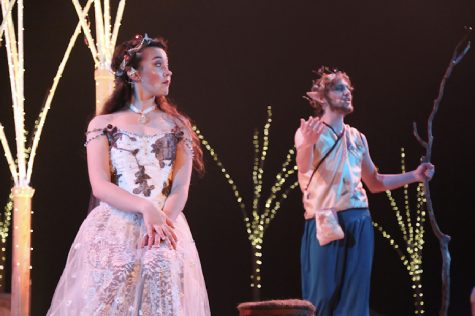
“I was coming home on the bus when I remembered one of the things that was said in a workshop, which was that ‘people don’t do classical theatre anymore, we really wish people would bring more classical theatre.’ So on the bus, literally in the middle of Indiana, I thought of She Stoops to Conquer, which is a show I was in in college. I brought it back to Deb and John. That calls for a big set, it calls for two sets. How are we going to do that? How will we build that on our stage and take it to York? That was a lot of work. We didn’t think we were going to make it,” Roney remembered.
Roney was so thrilled with the Internationals experience with She Stoops that when the opportunity came to try and be invited again, she had to go for it with Midsummer.
“It was a pretty amazing experience going out there and doing the performance and just watching the students. Talk about growth between auditions in September and the final performance at the end of June in Nebraska. The growth that happened to that show was pretty amazing! I think sitting and watching the final performance of Midsummer-on a brutally hot night, in a brutally hot auditorium-watching what our kids pulled out…it was like ‘that’s the show we’ve been trying to get to. They got it!” They were good throughout the whole thing, but that final peak show in June was just amazing. They knew as they were doing the show that they had gotten ‘there’,” Roney explained.
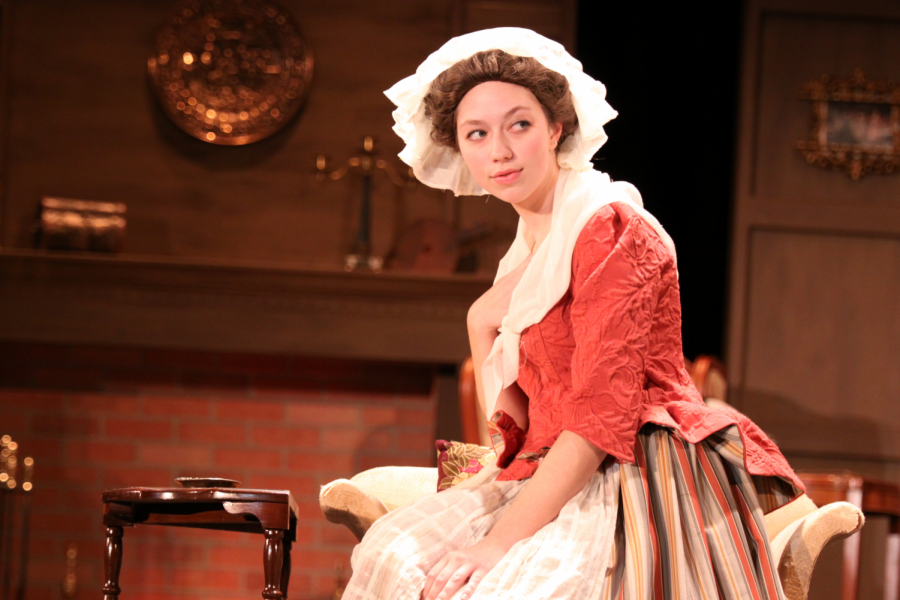
Scene 6- Breathing Through COVID
North Penn High School Theatre has seen a lot in its past 50 years, but nothing as significant as the COVID-19 pandemic. For the first time since 1981, there was no spring musical in 2020. As the pandemic-induced school closures continued further into the spring and summer, Roney and Buckner eventually realized there were no more possibilities for Shrek, and it was cancelled. Going into a virtual learning environment for the 2021-22 school year, the duo was ready to tackle the challenge of producing an original virtual play.
“At the time we were making decisions in June, I said ‘why don’t we write our own show?’ Having redone Once Upon A Time [in the fall of 2019], which is something we created 11 years ago, I thought ‘let’s see if we’re up for it. See if we can do it.’ It’s taken much longer-the show was supposed to go up the weekend before Thanksgiving, but that’s ok. We put it out there and said ‘who wants to come and start talking about this.’ We had a number of brainstorming sessions and different kids came to different ones. From that, we drew on some major themes,” Roney explained.
“It’s been an amazing process. [The students] They’ve been so generous, and honest, and creative. Writing things, researching things, creating things! It’s really chronicled this period of time, right up until December, and even looking ahead. In looking at some of the beginning edits, I think it’s going to really astound a lot of people. Again, it’s been the process that’s so important. The fact that these students, who have lived through this formative year, are going to have this to show to their grandchildren and say ‘this is who I was. This is what I lived through. This is what we were thinking about.’ That’s a gift they’ve given to themselves. This is a time capsule of this time we’ve been living through,” Roney continued.
As our country continues to live through a painful era of deep divisions, Roney stressed that Breathing Through COVID is not meant to spew political opinions or views from any side of the aisle.
“We’ve said from the very beginning, we’re not here to make political statements. We’re taking the advice of the words Shakespeare puts in the mouth of Hamlet when the players come to Elsinore; he gives advice to the players about how to act. Don’t overact. Your job in theatre is, [as Hamlet says, “to hold, as ’twere, the mirror up to nature, to show virtue her own feature, scorn her own image, and the very age and body of the time his form and pressure”] This is what’s going on. It’s not really making a judgement on it. I think that’s what they’ve been able to do in this show,” Roney said.
“Andrea and I have just been amazed with the thoughtful, creative, honest work that the students have put in and the research that has been done. I leave rehearsals, and it’s just…they’re amazing. They truly are amazing. They put their hearts and souls into the show. I don’t know what more you could ask of anyone,” Buckner added.
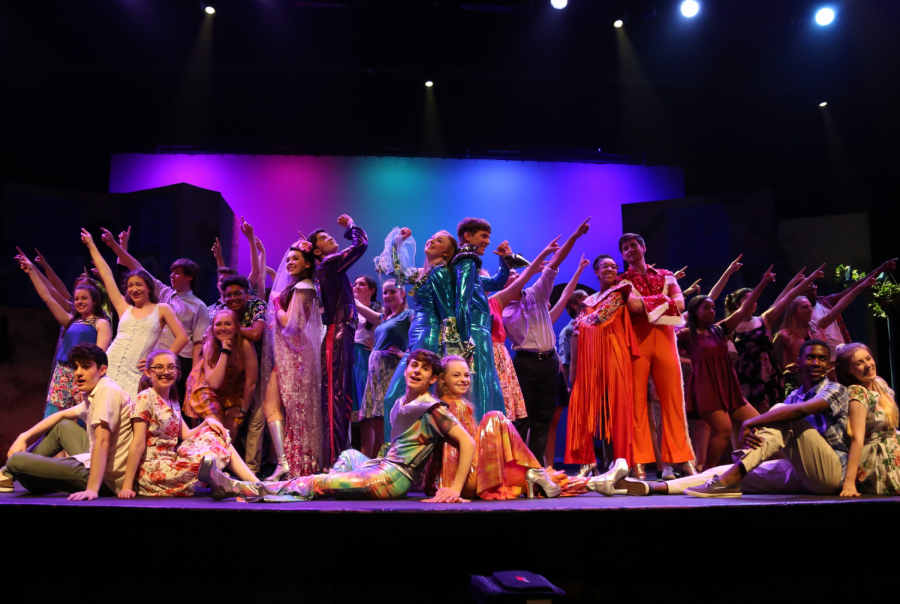
With more high schools producing virtual shows as licensing opening up, smash hit Hamilton thriving on Disney+, and entertainers showcasing their talents on platforms like Youtube and Tiktok, Roney knows that COVID-19 has permanently changed the theatre industry.
“I think the industry has changed. Will there always be live theatre? Yes there will. Movies couldn’t kill it, radio couldn’t kill it, TV couldn’t kill it. There’s always that need to gather in the dark with people and tell a story. I know that will happen. Do I think the industry’s been changed by this time? Yes! And the skills these kids have learned during this time they’re going to need,” Roney said.
NPHS Theatre has always been limited to two shows a year due to the assignment of the auditorium to other school and community groups throughout the year. If there continues to be a virtual aspect to the program, there would not always be a need for the auditorium and the possibilities are, in effect, limitless.
“We’ve always been limited to doing two shows a year, fall and spring, because the auditorium calendar is so carefully orchestrated…maybe we’ll be able to, with licensing, be able to give some other opportunities through the course of the year that we’d never been able to before because of our limitations with physical space,” Roney noted.
Scene 7- The Legacy
During Louden’s Knights of Honor induction in October 2018, Roney described taking over for Louden as “inherit[ing] one of the finest public school theater programs in the United States, the rareness of which I appreciate more each year.” I asked Roney and Buckner to elaborate on exactly how they came to realize that.
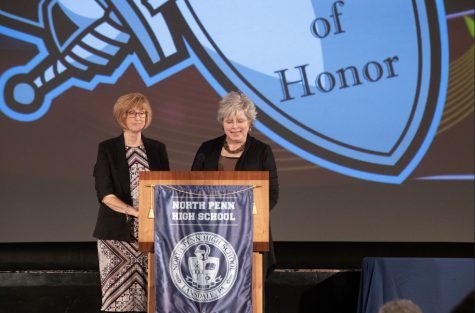
“It was a 34-year old program when I walked into it, and yeah, I already knew it was there. I didn’t know the extent of it until I got more involved in other high school programs across the country, but I already knew that about the program. A lot of our students who come back to visit say that. Whether they go into theatre or not, they go to college and realize the college productions aren’t as good as our high school ones. Or they talk to other students from other places and, ‘wow. I didn’t realize other places didn’t have this.’ It’s just what you know. I think it is a perspective you get as an adult, looking back with other experience that makes you realize it,” Roney said.
“Going away to college and then coming back into the program gives you a whole different appreciation. Sometimes when you’re a part of something, you take it for granted, and really don’t know what it is until you’re outside and you see it. It’s a realization over the years is what I would say. I took it for granted at the beginning as a student. It’s different when you come back as an adult,” Buckner added.
As we wrapped up our conversation, Roney and Buckner both emphasized how, despite sharing a few anecdotes, a handful of highlights could never truly capture the essence of their respective NPHS Theatre journeys.
“I don’t think there’s any one thing. I know for me, I came in with a lot of experience, but I’m a much better teacher, director, and person than I was 16 years ago. For working with all the different students. For working with Deb. For being challenged. Deb has made me think through things, and very often, she’s the wise voice that comes in and says ‘maybe you’re being a little presumptuous with that. Maybe we need to step back and think about this for a moment.’ It’s enriching being a part of all of this. We’ve pulled out a couple of moments from things, but as Deb said, with every single show, every single class, every interaction with students, there’s something there. Something that’s built. A human contact that is to be treasured. Very often, I say to students during the course of a show, take pictures in your heart. I have such a photo album of moments and faces. Even if sometimes I don’t remember the name, I remember the moment. I remember the smile or the cry or the hug that was shared. How enriching is that. It’s just amazing,” Roney articulated.
“It’s an accumulation of experiences through the years. It’s just a very special experience that…I was just talking with the kids in this particular show, actually, about collaborating. We talked about how every single show is different, and the students are different. In this show, doing it this way, and not personally being together, initially was a concern. But there’s been some special experiences that we’ve had because we’ve had a lot of intimate conversations like we’re having right now that perhaps, in actual rehearsal space, wouldn’t have occurred. You go in with your eyes wide open with every single show that you do, from the audition process and on, it’s just no two are the same. Which I think is the other part of this. It’s exciting. The brain loves novelty, and so, I think we have a novel experience every time we do a show,” Buckner added.
For the future, there will come a day when Roney, Buckner, and the entire NPHS Theatre team is able to return to that auditorium, and, as Roney says, “It’ll be coming home.”
“When you put so much of your heart and soul into something in a space, it’s a sacred spot. All the people and the moments that are held in that auditorium. For me, any theater has always been a sacred space, but, when you’ve spent so much time in a particular theater, it becomes even more special. We’ll see what the future brings. There’s no predictions right now, because I don’t think we know enough of where we’re going. When it’s safe, we’ll do it. Until then, we’ll be creative,” Roney said.
“You walk through the door, and the first statement is from a student to say ‘hi’ and you put that music on. It just goes away, and you’re just in a space that makes you feel good. Makes you feel safe. Makes you want to be there,” Buckner explained. “The theatrical experience eases all your senses. It’s interesting, because, from when I was a student at NPHS, to tomorrow if I walked in there…all the lights out, you walk into the dark space, and there is a sense that comes over you. There’s a certain smell in that auditorium; it’s nowhere else. When you walk in there, you can just sit down, right in the middle of that stage, and you just feel at home. It’s just a special space.”
INTERMISSION
When the curtain rises…Act 3: The Alumni. To be published Spring 2021.
